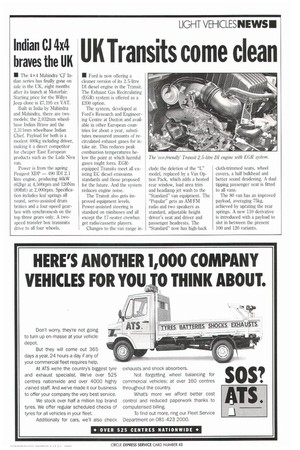UK Transits come clean
Page 27

If you've noticed an error in this article please click here to report it so we can fix it.
/ Ford is now offering a cleaner version of its 2.5-litre 1)1 diesel engine in the Transit. The Exhaust Gas Recirculating (EGR) system is offered as a £200 option.
The system, developed at Ford's Research and Engineering Centre at Dunton and available in other European countries for about a year, substitutes measured amounts of recirculated exhaust gases for intake air. This reduces peak combustion temperatures below the point at which harmful gases might form. EGRequipped Transits meet all existing EC diesel emissions standards and those proposed for the future. And the system reduces engine noise.
The Transit also gets improved equipment levels. Power-assisted steering is standard on minibuses and all except the 17-seater crewbus get radio/cassette players.
Changes to the van range in dude the deletion of the "L" model, replaced by a Van Option Pack, which adds a heated rear window, load area trim and headlamp jet wash to the "Standard" van equipment. The "Popular" gets an AM/FM radio and two speakers as standard, adjustable height driver's seat and driver and passenger headrests. The "Standard" now has high-back cloth-trimmed seats, wheel covers, a half bulkhead and better sound deadening. A dual tipping passenger seat is fitted to all vans.
The 80 van has an improved payload, averaging 75kg, achieved by uprating the rear springs. A new 110 derivative is introduced with a payload to slot in between the present 100 and 120 variants.




















































































































